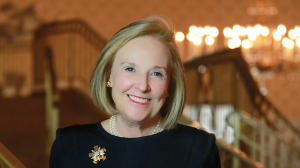$2.2 Million Haller Foundation Gift to Benefit Kidney Transplant Research
Once a person receives a new kidney, life is forever changed—not only for the recipient but also for the recipient’s family. Linda Haller and her family know this all too well.
Haller, of Fort Lauderdale, Florida, says the journey leading up to and after her adult daughter’s kidney transplant in 2017 was at times difficult—from being on dialysis to waiting for a donor, to learning to adjust to life after the transplant. Haller says she can’t imagine what those experiences are like for families who don’t have the financial means or resources to navigate their way through the transplant process. That’s why she and her family, through their foundation, the Henry E. Haller Jr. Foundation, decided to make a gift of $2.2 million to Duke in support of chronic kidney disease and kidney transplant research.
After learning in 2016 that her daughter, Kelly Shannon, had renal failure, which would require a kidney transplant, Haller says her first reaction was to get her on every waiting list possible. “When you read about it, that sounds quite easy, but it’s really not,” Haller says. “I’ve looked back on that so many times and thought, how do people that don't have the resources we have do it? It's got to be incredibly difficult.”
Shannon’s renal failure came as a result of a genetic condition called Alport syndrome. Eventually she was able to get on waiting lists for a kidney transplant at several medical centers across the country, and fortunately, the following year a donor was found. Because the hospital where she received the transplant was in Pennsylvania—hundreds of miles from her Charlotte, North Carolina, home—Shannon, 47, had to spend eight weeks away from her husband and two children, living in a hotel with her mother while she received the transplant and follow-up care.
“Again, through all of this, you're thinking, how many people can afford a hotel for eight weeks and to fly back and forth?” Haller says.
Realizing how fortunate her family is, Haller says, they began to seek ways to give back in the hopes of making life better for others facing kidney disease and kidney transplant. Even though Shannon did not receive her care at Duke, once she, along with her mother and her brother, Kevin Boyce, who serves on the family foundation board, learned of the work being done at Duke, they had no doubt where they wanted to give their support.
The gift will support four initiatives that Duke researchers hope will advance innovations in research and care in chronic kidney disease and kidney transplant. One initiative involves studying new anti-rejection drugs and finding ways to fight the most common causes of long-term organ rejection. Another includes using technologies to create unique immune profiles of patients, which will allow for personalized immunotherapy regimens. Support from the Haller Foundation will also help Duke researchers find better therapies to protect kidney health and prevent cardiovascular disease, which is a long-term health risk for kidney transplant recipients.
A fourth initiative will involve creating an online digital library of short educational videos. Many transplant centers offer pre-transplant patient education, but often there is less emphasis on post-transplant education. Duke researchers aim to use the videos to provide both pre-transplant and post-transplant education. They also hope to measure the videos’ effects on areas such as patient medical knowledge, medication adherence, and hospital readmissions.
“I think the video series will be particularly meaningful,” Haller says. “It's going to impact people daily.”
Haller says her daughter is doing well and able to enjoy life more, particularly with her children, now that she is no longer on dialysis. Haller adds that she hopes the Haller Foundation’s gift to Duke is just the beginning of a long-term partnership that will have a lasting effect.
“The ultimate goal is to just try to help more and more people,” Haller says. “We knew if we were going to give philanthropic support to any teaching institution, we really wanted it to become an essential tool in recruiting and providing resources that would guide the leaders to make greater impact on society, and so that we could in some small way make things better for other families in the same boat.”



